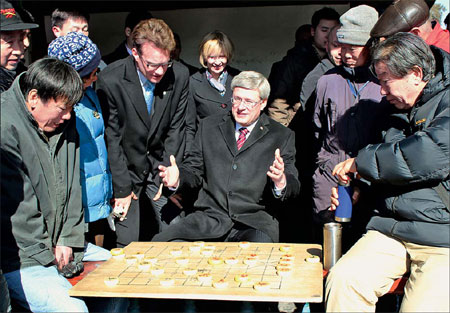Canada trade links tightened
Updated: 2012-02-09 09:01
By Cheng Guangjin and Cui Haipei (China Daily)
|
|||||||||||
|
Canadian Prime Minister Stephen Harper shares a light moment with two Beijing residents playing Chinese chess during a visit to the Temple of Heaven in Beijing on Wednesday. [Photo / China Daily] |
Wen and Harper witness signing of agreements across a range of sectors
BEIJING - China and Canada signed a series of agreements on Wednesday covering energy, investments and other sectors, in a sign of improved ties amid the global economic slowdown.
China wants to increase imports of energy and resources from Canada, Premier Wen Jiabao told Canadian Prime Minister Stephen Harper before they witnessed the signing of nine deals, including a Memorandum of Understanding on energy cooperation.
Wen also urged the early signing of an investment protection agreement and said the two sides could step up discussions on the feasibility of a free trade agreement.
Other deals signed covered science, technology, academic exchanges, the development of natural resources and Canadian beef and tallow exports to China.
Harper, on a five-day visit to China that started on Tuesday, leads a strong delegation of five ministers and 40 business leaders.
Negotiations on a foreign investment promotion and protection agreement have been concluded, Wen said.
China and Canada began negotiating the agreement in 1994 but for years made little progress.
Both nations will need to conduct a legal review of the deal and then sign and ratify it before it can take effect, according to Reuters.
"The investment agreement will help boost economic and trade cooperation between China and Canada", Shi Yinhong, a researcher at the China Institute of International Studies, told China Daily.
Canadian investment in China rose by 39 percent year-on-year in 2010 to reach nearly $5 billion. Chinese investment in Canada totaled $14 billion in 2010, an increase of 9 percent from 2009.
Wen also urged the two countries to step up joint studies on the feasibility of a free trade agreement.
China is Canada's second-largest trading partner. Bilateral trade stood at almost $50 billion in 2011, up $6 billion from 2009. The two countries set a target of increasing bilateral trade to $60 billion by 2015.
In the energy and resource sectors, Wen said, the two countries should set up a long-term partnership.
Wen said China is willing to increase imports of Canadian energy and resources, and enhance energy cooperation, including nuclear.
"The agreements being signed today, over such a wide range of areas, are further testimony that we are taking relations to the next level and further strengthening our strategic partnership," Harper said in a statement.
This is Harper's second visit to China. Analysts suggest that Harper is trying to push oil sales and closer economic ties following the rejection by US President Barack Obama of a pipeline carrying Canadian oil across the continental US for environmental concerns.
"Diversifying our markets is a key priority for Canada," Harper told Wen.
"We look forward to expanding our cooperation in any important areas, including energy, natural resources, tourism and education," he said.
At 170 billion barrels, Canada is estimated to have the world's third-largest oil reserves after Saudi Arabia and Venezuela.
This augurs well for future cooperation, Xia Yishan, a senior expert on energy strategies and researcher with the China Institute of International Studies, said.
The rapid economic development in China makes it increasingly energy hungry, Xia said.
China also needs to diversify its sources for energy imports, about 70 percent of which come from the Middle East and North Africa, he added.
As Canada is also trying to diversify its energy export market, "China is the first choice", Xia said.
Harper also spoke at a tourism office in Beijing, promoting Canada as a vacation destination.
China granted Canada Approved Destination Status in June 2010. More than 227,000 Chinese travelers had visited Canada in the first 11 months of 2011, up 24.2 percent year-on-year.
Harper first visited China in 2009. Since then, the relationship between the two countries has become much stronger, analysts said.
Harper missed the 2008 Beijing Olympics and did not travel to China until late 2009. President Hu Jintao visited Canada in 2010.









